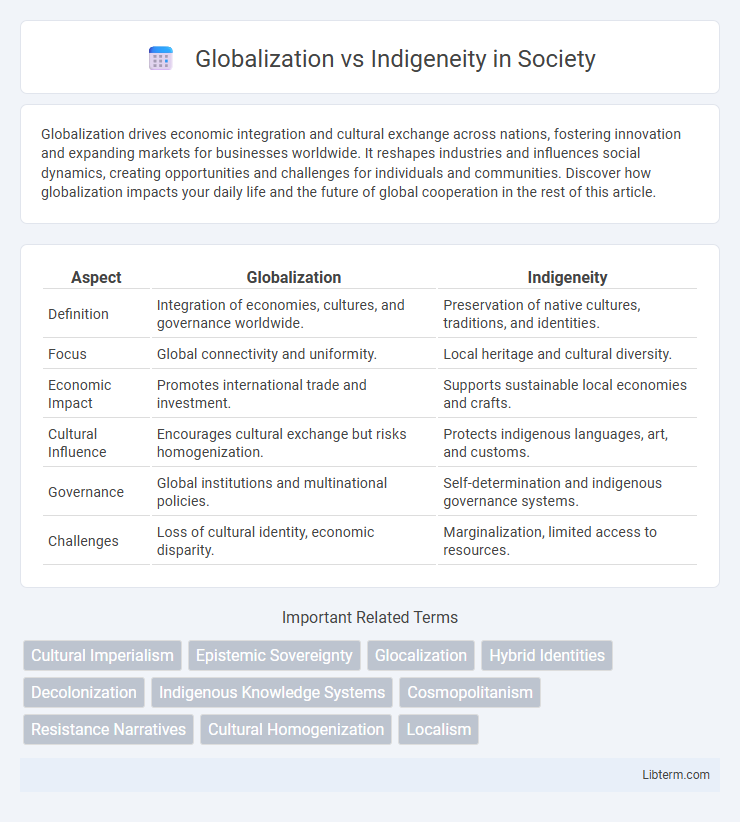Globalization drives economic integration and cultural exchange across nations, fostering innovation and expanding markets for businesses worldwide. It reshapes industries and influences social dynamics, creating opportunities and challenges for individuals and communities. Discover how globalization impacts your daily life and the future of global cooperation in the rest of this article.
Table of Comparison
| Aspect | Globalization | Indigeneity |
|---|---|---|
| Definition | Integration of economies, cultures, and governance worldwide. | Preservation of native cultures, traditions, and identities. |
| Focus | Global connectivity and uniformity. | Local heritage and cultural diversity. |
| Economic Impact | Promotes international trade and investment. | Supports sustainable local economies and crafts. |
| Cultural Influence | Encourages cultural exchange but risks homogenization. | Protects indigenous languages, art, and customs. |
| Governance | Global institutions and multinational policies. | Self-determination and indigenous governance systems. |
| Challenges | Loss of cultural identity, economic disparity. | Marginalization, limited access to resources. |
Defining Globalization and Indigeneity
Globalization refers to the increasing interconnectedness and interdependence of the world's economies, cultures, and populations driven by trade, technology, and communication. Indigeneity denotes the identity, culture, and rights of indigenous peoples who maintain distinct traditions, languages, and social systems tied to their ancestral lands. Understanding globalization alongside indigeneity highlights tensions between global homogenization and the preservation of unique indigenous knowledge and practices.
Historical Contexts of Globalization
Historical contexts of globalization reveal complex interactions between expanding empires and indigenous populations, where economic, cultural, and political exchanges reshaped societies across continents. Indigenous communities often faced displacement, cultural assimilation, and resistance amid colonial expansion driven by globalization forces since the 15th century. The transnational flow of goods, ideas, and people during early globalization profoundly affected indigenous ways of life and contributed to ongoing debates about cultural preservation and sovereignty.
Indigenous Worldviews and Traditions
Indigenous worldviews emphasize interconnectedness with nature, community-centric values, and ancestral knowledge systems that have been sustained over millennia, contrasting sharply with globalization's often commodified and homogenizing impact. These traditions prioritize holistic well-being, spiritual relationships with the land, and oral knowledge transmission, which are frequently marginalized by global economic and cultural paradigms. Preservation of Indigenous epistemologies is critical for biodiversity conservation, cultural diversity, and fostering resilient, sustainable societies in the face of accelerating global change.
Cultural Exchange and Cultural Erosion
Globalization facilitates cultural exchange by allowing diverse societies to share traditions, languages, and practices, enriching global heritage and fostering mutual understanding. However, this interconnectedness also accelerates cultural erosion for indigenous communities, as dominant global cultures often overshadow and diminish unique indigenous identities. Preserving indigeneity requires conscious efforts to protect native languages, customs, and knowledge systems amid the pervasive influence of global cultural norms.
Economic Impacts on Indigenous Communities
Globalization often exposes indigenous communities to external markets, leading to increased economic opportunities but also risks of cultural erosion and exploitation of resources. Indigenous economies frequently face challenges integrating with global capitalism, resulting in income disparities and loss of traditional livelihoods. Strengthening indigenous ownership rights and promoting sustainable economic practices can mitigate negative impacts while fostering community resilience.
Language Preservation versus Linguistic Homogenization
Globalization accelerates linguistic homogenization by promoting dominant languages like English and Mandarin, often at the expense of indigenous languages' survival. Language preservation efforts emphasize documenting, revitalizing, and integrating indigenous languages into education and media to maintain cultural identity and linguistic diversity. Balancing global communication with indigenous language preservation is crucial to preventing language extinction and sustaining cultural heritage worldwide.
Resistance and Adaptation Strategies
Indigenous communities employ resistance strategies such as cultural revitalization, legal advocacy, and land rights movements to counteract the homogenizing effects of globalization. Adaptation strategies include integrating selective aspects of global technology and economic systems while preserving traditional knowledge and social structures. These dual approaches enable indigenous groups to maintain identity and autonomy amid global pressures.
Environmental Perspectives and Land Rights
Globalization often imposes external economic and environmental pressures on indigenous lands, threatening traditional ecological knowledge and sustainable practices. Indigenous communities maintain deep connections to their territories, advocating for land rights that support biodiversity conservation and environmental stewardship. Recognizing indigenous land tenure systems is crucial for effective climate action and preserving ecosystems amid global environmental challenges.
Policy, Governance, and Representation
Policy frameworks shaping globalization often marginalize indigenous governance systems, undermining their sovereignty and diminishing local representation in political arenas. Indigenous communities advocate for recognition of customary laws and inclusive governance models that respect traditional knowledge and cultural rights within global policy discussions. Effective representation of indigenous peoples requires integrating their voices into decision-making processes at international levels, ensuring policies prioritize cultural preservation alongside economic development.
Pathways Toward Equitable Coexistence
Globalization fosters interconnected economies and cultures but often threatens the preservation of Indigenous knowledge and identities. Pathways toward equitable coexistence prioritize the recognition of Indigenous sovereignty, protection of cultural heritage, and inclusive policy frameworks that empower Indigenous voices in global and local decision-making processes. Collaborative initiatives in education, sustainable development, and legal reforms enhance mutual respect and create balanced opportunities between global influences and Indigenous traditions.
Globalization Infographic

 libterm.com
libterm.com